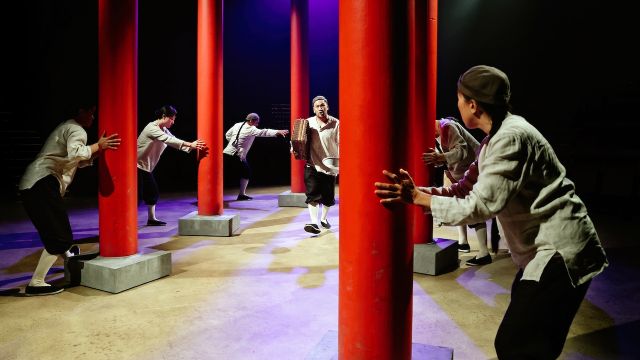The Poison of Polygamy
Since ancient times, picaresque fables have followed an often irredeemable anti-hero through a long journey of life and reparation. This tale, serialised in a Chinese Australian newspaper from 1909, follows an opium-addicted émigré from Guangdong to the Victorian goldfields and onto early Melbourne opportunities for more wealth and depravity.

Recently rediscovered and translated, this first Chinese language novel in Australia was written by a Christian preacher Wong Shee Ping with a good salacious eye but also a firm moral drive against the Chinese poison of polygamy. In this alluring theatrical adaptation an outstanding Shan-Ree Tan plays the preacher as narrator and also the bewitching rascal Sleep-Sick.
It’s a long epic of a narrative by Anchuli Felicia King, staged in the round by an ensemble of eight inventively directed by Courtney Stewart, AD of Brisbane’s La Boite Theatre which is a co-producer with STC. Sleep-Sick’s journey vividly dramatizes our history with this early Chinese experience, shunned by locals, over-taxed and threatened on the gold fields, but proving themselves indispensable as resourceful traders and market-gardeners … and as dismissive of Aboriginal people as the white man.

Sleep-Sick’s fellow-travellers are more community-minded than he: the politicised poet Pan doomed to drink (Gareth Yuen), the forgiving Ching (Ray Chong Nee) who builds and loses his fortune, and the generous gardener (Silvan Rus). All fall victim to Sleep-Sick’s frauds and lusts. As does his patient traditional Chinese wife back home (Merlynn Tong).
Only Sleep-Sick’s fiery concubine (Kimie Tsukakoshi) can match his gusto and deceptions. And with murder and violence, comes more cultural comment about polygamy, contrasting rights for women here and in China, historic marriage and religious conventions, Chinese émigré individualism and occasional community assertion.

With Anna Yen and Hsin-Ju Ely in other roles, the ensemble includes other standout performance besides Tan, but the acting style is heightened and over-explanatory to match King’s florid words, and still more to address audiences on four sides. Words and subtilties get lost, our empathy strained, and the play is overlong.
And yet Stewart’s pace and flair creates a compelling well-told story with an inspired use of six red pillars constantly moved into new settings across the space (designer James Lew). Such new voices, and evocative tales from neglected chapters of our history, deserve new audiences.
Martin Portus
Photographer: Prudence Upton
Subscribe to our E-Newsletter, buy our latest print edition or find a Performing Arts book at Book Nook.

